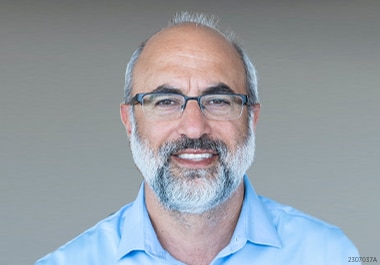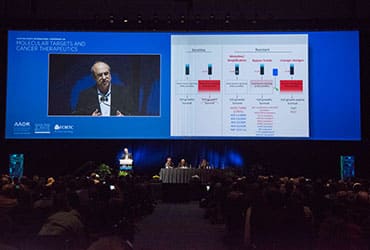Jeffrey Engelman and the Mitzvah of Cancer Research
How a fellowship from AACR enabled a young scientist to stay in the lab and make the discoveries that launched a successful career.
Young scientists dreaming of making great discoveries often face the unpleasant reality of an uncertain future after their postdoctoral training.
“Only a small minority of PhD students will ever have opportunities to become principal investigators in academic settings and direct their own independent research programs,” as Jonathan W. Yewdell, MD, PhD, of the National Institutes of Health wrote in 2008.

That was the reality facing Jeffrey Engelman, MD, PhD, when he was nearing the end of his doctoral training in the lab of Lewis Cantley, PhD, at Dana-Farber Cancer Institute in 2005, focusing on molecular pathways in lung cancer. Where could he find the support needed to make his mark and open the way to an independent lab?
“I still needed time protected for my laboratory research training,” he said in an interview with AACR. Engelman applied for and received an AACR-AstraZeneca-Cancer Research and Prevention Foundation Fellowship in Translational Lung Cancer Research that helped support him from 2005 to 2008.
“This grant at this juncture was really instrumental in bridging that gap,” he said. “It’s a very tenuous period for young investigators going from a post doc in someone else’s lab to establishing your own lab.”
The project funded by the grant was called “Mechanism of activation of the PI3-kinase/Akt pathway in gefitinib-sensitive and resistant non-small cell lung cancer.”
The grant enabled Engelman to run studies that led to two major publications in 2007, one in Science, which reported an important discovery about how MET amplification leads to drug resistance in lung cancer.
“I think there’s incredible value, from a basic standpoint, in learning how to do research very, very well,” he said. “If you can have more time in a very rigorous environment for 2 or 3 years, when you’re a junior scientist, that will serve you so well for the next forty or fifty years of your career that I think it’s something worth really considering.”
In Cancer Research, he reported results that supported the development of dacomitinib (Vizimpro), a drug later approved by FDA as first-line treatment for patients with EGFR-mutated metastatic non-small cell lung cancer.
Engelman moved to Massachusetts General Hospital and became director of thoracic oncology in 2009 and was later also named director of molecular therapeutics. He and colleagues at Mass General, Dana-Farber, and other institutions pumped out papers on therapies for lung cancer.
”It was a very magical time at MGH,” he recalled. “It was really awesome. We were very collaborative, very interdisciplinary and very supportive of each other.”
His attention increasingly turned to the problems of drug discovery, and in 2016 he joined Novartis Institutes for BioMedical Research (NIBR) as global head of oncology.
“The real draw was the opportunity to actually make therapeutics and decide what to go after, and to try to take all of that medical and biology experience and try to use it to energize efforts to make drugs,” he said.
Novartis is one of the biggest pharmaceutical companies in the world. Engelman’s next move, after five years, was to jump into the biotech world as chief science officer and co-founder of a startup called Treeline Biosciences.
“I really loved the drug discovery that I learned at Novartis,” he said. “I was more attracted, though, to trying to do drug discovery in a smaller environment than a large pharma. I really wanted to focus on the science, the drug discovery, and the patient. And it’s easier to do that in the smaller companies sometimes.”
Treeline has kept a low profile so far, but Engelman says he is reveling in the startup experience.
“I love the high expectations,” he said. “I love the roller coaster ride and I love building a company, so I’m really enjoying it. I’m very optimistic about what we’re working on.”
After moving from academic medicine to industry to biotech, Engelman has no regrets about his career choices.

“I loved academia. I loved what I had going on there. I wouldn’t trade that for anything in the world. If I were going back 20 years, I’d do exactly the same. I’d apply for that grant from AACR. I love the knowledge base I have because of all those experiences.”
A grant like the one he receives from AACR is “an opportunity to become awesome on someone else’s dime,” Engelman said, “to really become something in terms of your expertise and your scientific prowess and capabilities.” Carrying out the research made possible by such a grant can be essential to a young scientist’s career, he said.
“You need to think broadly, to think critically, and to think mechanistically,” Engelman said. “These are skill sets that that will serve you well wherever you go in your research career.”
Engelman has seen biomedical research from several perspectives and believes that it is a very rewarding career.
“There are so many ways that you can funnel your energies and really try to have an impact, and they can be taking care of patients in the clinic, doing research in academia, or doing what I’m doing now, which is trying to make drugs.
“I would say that the one great thing about biomedical research is first of all, the goal of it is just so beautiful, to try to spend your time working to hopefully help other people. It’s a mitzvah (a good deed) to work in that way.”